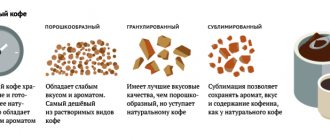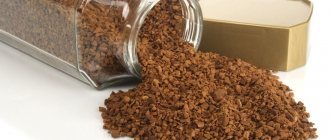What effect does caffeine have on the cardiovascular system?
Caffeine is the main substance in the drink, which underlies everything - both beneficial and harmful to the human body. The fewer deviations in health, the less chance of harming blood vessels when consuming it.
An initially healthy heart and the walls of blood vessels not clogged with cholesterol deposits are practically a guarantee that coffee will not cause any harm.
Positive Impact Aspects
Almost any natural product has many beneficial properties. And this alone gives reason to learn about the positive properties of natural coffee and its beneficial effects on the heart and the body as a whole.
- Contains potassium and magnesium. Coffee contains a lot of vitamins and microelements, including potassium and magnesium, which are vital for the heart muscle. See also the top 10 foods containing potassium.
- Reduces cholesterol. Both freshly ground and instant coffee are recognized as products that lower bad cholesterol levels in the blood.
- Fights infections and removes toxins. It is used in medicine, in particular, for certain infectious diseases, as well as if it is necessary to neutralize the effects of drugs, sleeping pills or poisons that suppress the central nervous system.
- Is a stimulant. It gives you the opportunity to cheer up when the body’s strength is running low. It stimulates brain function and affects physical and mental activity, so it is used not only as a tasty drink, but also as a natural energy product.
The invigorating drink has a number of properties that are an additional bonus for the body, in addition to its beneficial effects on the heart and blood vessels. This is first of all:
- antitumor substances that reduce the risk of developing cancer of the stomach, small and large intestine;
- substances that increase performance , mood, and prevent the development of stress even against the background of drinking alcohol, smoking cigarettes and an unfavorable social environment;
- prevention of diabetes, Parkinson's disease, asthma, liver cirrhosis and other diseases.
See also:
- 9 fruits and vegetables that are good for the cardiovascular system.
- Why nuts are important for the heart: what does the science say?
Negative aspects
Like any food product, it may have contraindications, as well as reasons for restriction.
- Inappropriate consumption of large quantities can cause dehydration , as it has a diuretic effect. This has a bad effect not only on tone in general, but also on the cardiovascular system. But knowing that about half an hour after drinking a cup of drink you need to drink a glass of drinking water, the problem can be easily avoided.
- It flushes calcium and some other microelements from the body , which are necessary for the proper functioning of the cardiovascular system. This can be prevented by adding natural milk or cream.
- With a sharp change in diet and the abolition of regular coffee consumption, the body can respond with depression of the physical and mental state: loss of strength, increased drowsiness, decreased physical and mental activity, hypotension and even real depression.
- Caffeine-containing products can aggravate symptoms of existing medical conditions.
The drink is strictly contraindicated for:
- stomach ulcers and other inflammatory processes in the gastrointestinal tract;
- renal failure;
- neuralgic diseases.
The different effects of the drink are related to the dosage and methods of its preparation. However, it is a myth that this drink can and does kill our heart.
Coffee: understanding the benefits by reading research
Coffee is one of the most common caffeinated beverages in the world. The purpose of the topic: to understand whether coffee is good or bad and find the most useful methods of preparation. When creating the post, more than 100 scientific publications , links to them are at the end of the message.
Before we continue, please vote in the poll above. What did you think (it seemed, it didn’t necessarily mean that you already had a well-founded opinion): is coffee more likely to be beneficial or more likely to be harmful?
Benefits of coffee
Not everyone knows how to use multi-letter words, so I’ll say right away that coffee is rather healthy, but there are nuances.
Next we will consider:
- coffee and overall mortality
- effect on the cardiovascular system
- cancer
- metabolic syndrome, type 2 diabetes, obesity, liver disease, cognitive disorders, depression, urolithiasis
Coffee and all-cause mortality
The most important point. If the overall mortality and overall life expectancy for coffee drinkers is higher (all other things being equal), then it is useful, and everything else is just detail.
Meta-analyses on the effect of coffee on general and specific mortality show that regular moderate consumption of coffee reduces the relative risk of overall mortality , reduces mortality from cardiovascular diseases, and has a neutral or positive effect (especially for non-smokers) on mortality from cancer.
Below are some graphs from meta-analyses:
The first two show the dependence of mortality on various causes and the amount of coffee consumed per day.
Effect on the cardiovascular system
Previously, it was mistakenly believed that coffee had a negative effect on the cardiovascular system. The first studies did not take into account the correlation between coffee consumption and bad habits, especially smoking. Later, correlations were found: among people who drink coffee, there are also more people who smoke, drink alcohol, have insufficient physical activity, have a lower level of income, and eat fewer vegetables and fruits, but more red meat. In modern studies, these dependencies were taken into account and comparisons were made for each group separately.
In the short term, coffee can actually lead to increased blood pressure and resting heart rate, both of which are risk factors for cardiovascular disease (CVD). But in the long term, the relative risks of mortality from CVD are lower. Graphs from an article on long-term coffee consumption and heart disease from the journal Circulation (American Heart Association):
At A, B and C are the risks of CVD, coronary heart disease and stroke, respectively, depending on the amount of coffee consumed.
In addition, there have been studies that have noted some positive correlations (less common) for coffee drinkers with vein thrombosis and arterial calcification.
One of the negative effects that persisted in the long term is an increase in the level of LDL (“bad cholesterol”) in the blood, but this can be prevented by proper brewing of coffee (I tempt you to read to the end where this will be).
Coffee and cancer
The effect of regular coffee consumption on the development of various types of cancer has turned out to be the most controversial. There are tons of studies, but the results vary greatly.
Because we still get all the effects at once, it makes sense to talk only about the overall effect on mortality from all types of cancer. And it looks very much like it's neutral. Not in the sense that coffee has no effect on cancer, but in the fact that it reduces the likelihood of some types, increases others, but most of all the types for which researchers cannot come to clear patterns. This also follows from the methodology: most statistics are collected simply from the results of filling out questionnaires, and completely different things can lie behind a person’s answer about the level of coffee consumption. What type of coffee is consumed, how it is brewed, what is added to it, what it is usually combined with and a bunch of other related things have a decisive influence on the result.
Recently, a large review article was published from the authoritative journal Annual Review of Nutrition, which, among other things, has a good visual illustration of the relative risks of different types of cancer for groups of minimum-maximum coffee consumption:
There is strong variability in results across different types of cancer. Cancer risk chart from the same article:
Overall cancer mortality is slightly lower for 1-4 cups/day and increases with increasing consumption. Given differences in consumption patterns and incompletely understood mechanisms, it is impossible to speak of a significant correlation between cancer mortality and coffee consumption. Other large observational studies report a lack of statistically significant correlations.
So far, we can only talk about the overall neutral effect of coffee consumption on cancer mortality. Further research needs to be monitored.
Other positive effects
Statistically significant correlations for coffee drinkers were found for:
- Alzheimer's disease;
- metabolic syndrome and type 2 diabetes;
- chronic liver diseases;
- Parkinson's disease;
- urolithiasis disease.
For some of the diseases listed, the relationship between risk reduction and the amount of coffee consumed is direct; for others, the best results are with moderate consumption.
It is very important what kind of coffee you drink and with what. For example, regarding metabolic syndrome and type 2 diabetes, there are no contradictions between studies and the positive effect of coffee is not questioned, however, in a study from South Korea, the results were the opposite: increased coffee consumption, on the contrary, correlated with an increased risk of type 2 diabetes. The researchers themselves suggested that the problem is most likely in the culture of coffee consumption in Korea: the majority drinks instant coffee of the 3in1 type with added sugar and cream, and the problem may be precisely in the additives.
If we summarize the positive effects that correlate with coffee consumption, then it is already clear that coffee is most likely beneficial because on the main points (general mortality, cardiovascular diseases, cancer), the effect of regularly moderate consumption is positive or neutral. Now let's look at the negative effects.
Harm from coffee
The main points where coffee can cause harm are specific conditions or excessive consumption, although there are general side effects.
Coffee during pregnancy
Is it possible to drink coffee during pregnancy? The question is not the most pressing for me, so I grabbed it in passing. I quickly went through the studies, reading only the results, conclusions and paying attention to the place of publication.
There are studies that note a connection between coffee consumption and the risks of miscarriage, low birth weight of the newborn and acute leukemia.
In addition, in the recommendations of the World Health Organization there is a table “A consolidated list of WHO recommendations for the provision of prenatal care in order to create a positive pregnancy experience.” And there is the last point:
Pregnant women with high daily caffeine intake (more than 300 mg per day) should be advised to reduce caffeine intake during pregnancy to reduce the risk of fetal death and low birth weight birth.
Other negative effects of coffee
Because coffee can lead to a short-term increase in blood pressure. Hypertensive patients should exercise some caution. Although in the long term there is no connection between coffee consumption and hypertension.
There is research showing an increased risk of fractures and decreased bone mass in some regular coffee drinkers due to the loss of small amounts of calcium from drinking coffee. However, these amounts are small and two tablespoons of milk are enough to compensate for calcium losses from 1 mug of coffee (this does not mean that it is necessary to add milk or that milk is healthy, it is just given to give an idea of the scale of calcium losses). This effect can be significant only for people with a very poor diet and insufficient calcium intake; with a normal diet, calcium loss from coffee is not a problem because its supply is completely replenished.
There are also studies that have established some connection between coffee consumption and the risks of cancer of the esophagus and stomach (although coffee does not increase the overall mortality rate from cancer), but the effect may again be due to the culture of consumption. Drinks that are too hot can increase the risk of esophageal and stomach cancer, and it may not be the coffee itself, but the excessively high temperature of consumption.
Well, yes, caffeine is addictive . She is very weak and not dangerous, but this cannot be ignored.
Another important and not obvious point is the connection between drinking coffee and various bad habits. Among those who drink coffee, there are more smokers, higher consumption of alcohol and red meat, fewer fruits and vegetables, lower levels of physical activity and even lower levels of wealth and education. Most known correlations in studies are taken into account and comparisons are made for each group separately. However, it is not at all obvious whether you can add only coffee to your diet without unknowingly increasing the likelihood of picking up other bad habits.
Overall, the positive effects greatly outweigh the negative ones and coffee can very well be considered part of a healthy diet plan.
Coffee preparation methods and quantity
The most important point. Everything that was written about earlier can be summarized: coffee in general is healthy (if you are not pregnant) and you don’t have to be afraid to drink coffee. In fact, the phrase “drinking coffee” is very vague and there is huge variability in the composition of the finished drink. The composition depends on the raw materials used and the method of preparation. The content of both caffeine and other active components may vary significantly.
There is a method where there is a stage of filtering coffee through a paper filter , as well as instant coffee. In these cases, the final drink contains virtually no cafestol and kahweol, and regular coffee consumption does not lead to an increase in blood cholesterol levels, unlike preparation methods without a paper filtration step. There are also studies in which for filtered coffee there was a smaller increase in blood pressure when adding coffee to regular consumption, better results for metabolic syndrome and type 2 diabetes.
In order not to bother with special cooking methods, stop at any one, but add a filtration step through a paper filter. Well, or with instant coffee, if you like the taste.
The issue with filtration is important and coffee filtered through paper is actually healthier than unfiltered coffee. To the point that studies on the Scandinavian population mostly show a negative effect of coffee on the cardiovascular system, while on the American population, on the contrary, a positive effect. In Scandinavian countries, it is not customary to filter coffee through paper; in America, on the contrary, drip coffee makers with paper filters are common.
Important! We are talking only about coffee without additives. If you add sugar to coffee or drink it with cookies and the like, there can be no talk of any benefit.
The raw material is not of fundamental importance, i.e. type of coffee and roasting method. There are differences, but they are not critical and you shouldn’t bother about it. There are 2 main types of coffee: Arabica and Robusta. Differences in composition: Robusta has a higher caffeine content, while Arabica contains cafestol and kahweol. But they also differ in the taste of the finished drink, and this is the most important thing - choose what you like best.
The amount of coffee consumed is important. Most large studies have been done using questionnaires and coffee consumption has been measured in cups/day. The answer "circle" does not provide clear information about the dose, but still general conclusions on optimal amounts with this vague wording:
The optimal amount of coffee is 3-4 mugs per day.
- 2 mugs a day are also useful, but the effect is less pronounced.
- 5 mugs a day the result is already contradictory: somewhere better than 3-4, somewhere worse.
- 6+ mugs a day significantly lose, and in some respects even harm.
- During pregnancy, you should either give up coffee altogether, or significantly limit your consumption (or switch to decaffeinated coffee (requires further study)).
Decaf coffee and tea
There is no practical point in comparing coffee and tea too deeply, because... Both coffee and tea have strong variability in both types and methods of preparation. Because of this, it won’t be possible to give even a vague answer that it will be more useful.
On average, regular, moderate consumption of both coffee and tea correlates with neutral or positive health effects, and it is impossible to make a clear conclusion which is better - choose what you like best.
Decaffeinated coffee shares many, but not all, of the beneficial effects of coffee. Those. The effect of coffee on the body is not limited to the effect of caffeine. In general, it makes sense if you have contraindications to taking caffeine.
Conclusion: Moderate coffee consumption can be part of a balanced diet plan and even be beneficial, the optimal amount being 3-4 cups per day.
Disclaimers:
Everything written is a personal opinion based on an analysis of reviewed scientific publications and is not a call to action.
When writing, the mechanisms of action of coffee, clever words and terms, complex names of substances, etc. are deliberately omitted. because Nobody really needs this and their only point is to create the impression of the author’s “knowledge” and increase confidence in the information, but for this there is a list of sources at the end.
Most of the studies are observational and the data are obtained from the results of questionnaires, taking into account the huge samples, some of the shortcomings of this method are smoothed out, but it is still impossible to exclude all factors other than coffee that influence the studied parameters.
In most cases, the coffee-effect chain is not a direct effect, but some correlation between coffee consumption and these effects.
Published in the magazine “Infilife”, 08/21/2017 Author: Dmitry Polnikov
How much is acceptable to consume?
Since the study of the drink does not stand still, both nutritionists and doctors are constantly changing their point of view regarding its dosage for different people, depending on the age and condition of the body.
Recent studies by Russian and foreign doctors and biologists have shown that drinking 2-4 cups per day is definitely safe.
If desired, 1 cup of coffee with milk can be drunk even by children starting from 10-12 years old, and by pregnant and lactating women, if they are used to it before pregnancy and there are no other contraindications (kidney failure, inflammation of the gastric mucosa, etc.)
Research Proven
The largest study in recent years was conducted at Harvard, in 2011-2013. Scientists monitored the condition of people drinking coffee and a control group that did not drink this drink:
- Daily consumption of a cup of natural coffee reduced the incidence of heart attacks, strokes, and heart attacks by 30%.
- Those who drank a cup of coffee every 2-3 days were 20% less likely to develop heart disease than those who did not drink coffee at all.
- Drinking high doses of caffeine (about 6 cups per day) negates all the benefits and begins to cause harm.
If you have coronary heart disease or low blood pressure, you should drink coffee every day. As soon as you feel weakness, cold sweat, dizziness, tremors in your hands, you need to drink a cup of espresso, preferably without additives.
Should you drink instant drinks?
Instant coffee is more convenient to drink as it instantly dissolves in water. It is sold in three forms: powder, granular and sublimated, which distinguishes them only by the production method and appearance.
In terms of content, for a soluble product they often use not noble Arabica, but a lower grade - Robusta. Additionally, to make powder or granules, the outer layer of the bean, which contains caffeine, is often removed altogether. It can be said that most varieties of surrogate drink do not contain caffeine. It is for this reason that you want to sleep after drinking instant coffee.
But the absence of caffeine does not make it healthier: on the contrary, no one can know exactly what the purchased powder contains and how many elements of the periodic table are mixed in it.
The “invigorating” effect is associated primarily with the effect of getting used to the ritual of drinking the drink and its aroma. Some doctors even consider this addiction to be a real addiction that has nothing to do with a healthy lifestyle.
Concluding that an instant drink has no positive properties for the body, with the exception of psychological ones, we can say that there is simply no point in drinking it, unlike a natural one.
The very rare use of a soluble surrogate by a healthy person will not affect his health in any way, but for a permanent menu it is better to choose a natural product that needs to be brewed.
As for pregnant, lactating, children and sick people, for many of them even one dose of a surrogate may be enough to cause serious health problems.
The effect of coffee on the heart
It must be taken into account that the effects of coffee on the heart of an individual will vary. This depends on your health status and the substances contained in a particular drink. A stronger body absorbs caffeine faster than a body with a weakened metabolism. Some people are not recommended to drink such drinks at all due to weak immunity and poor absorption of coffee substances.
Let's try to figure out who benefits from coffee and is not forbidden, and who should pay attention to their well-being and heart rhythm in order to avoid unpleasant consequences on their overall health.
Can it cause chest pain?
Many drinkers have noticed pain under their left shoulder blade after drinking it.
But very often people have a number of health problems that they are not even aware of, but the symptoms of which are similar to heart pain. If a person drank a coffee drink and had a chest pain, this could result in illnesses such as:
- neuralgia;
- stomach ulcer;
- gastritis;
- pancreatic diseases, etc.
If these problems are excluded by doctors, then it is necessary to understand the answer to two important questions.
Why is this happening?
By affecting the central nervous system, caffeine can cause:
- increased excitement,
- increased heart rate,
- increased blood pressure
- and, as a result, heart problems.
Most often this occurs due to exceeding the permissible dose of consumption . Symptoms appear when a person drinks regularly 5-6 cups a day or after the usual normal dose, but in a state of any stress on the body (lack of sleep, acclimatization, increased fatigue, etc.).
What to do if pain has already appeared?
Is it possible to drink coffee if you already have chest pain? If, as a result of drinking the drink, tachycardia appears, the person begins to feel short of breath, or dizziness appears, you need to stop drinking the drink. In this case it is necessary:
- place it at a high angle, for example, on a high pillow;
- ventilate the room;
- give half a liter of clean and still water to drink in small sips;
- give the opportunity to rest for a few minutes.
If such attacks occur repeatedly , it is necessary to consult a cardiologist to rule out serious diseases of the cardiovascular system. During the period of examination, it is better to replace the usual taste with a very similar one: high-quality chicory will not only not harm the heart, but will also significantly improve the health of the entire body.
Not only harm, but also benefit
Over the last century, more and more research institutes have been monitoring whether drinking coffee is harmful to the heart, and in many cases it turns out that the situation is the opposite.
One to two cups a day is not only good for those with heart disease, but also helps reduce the likelihood of premature death from heart disease.
The fact is that in addition to caffeine, your favorite drink contains a special natural component - chlorogenic acid, which is the most powerful natural antioxidant, keeping cells healthy and young.
In addition, coffee has a positive effect on the endothelium. This is the tissue from which the inner surface of the heart and blood vessels is built. When she is healthy, the blood flows freely, the heart function is calm and rhythmic. This tissue controls blood clotting and is also responsible for the ability of platelets to cling to the walls of blood vessels. When endothelial dysfunction occurs and the risk of heart attack increases, caffeine seems to smooth out the walls of blood vessels, slowing down the attachment of platelets, that is, the blood clot develops more slowly, and there is time to consult a doctor and save a life.
Other frequently asked questions
There are many different myths around everyone’s favorite drink. Therefore, people often want to know the exact answers to many of their questions.
Sometimes there are simply no clear answers, but nevertheless, their options will give you the opportunity to draw your own conclusions depending on how you feel.
After consumption, the heart beats strongly: why and what to do?
If the heart begins to beat faster than usual and seems to tremble, this condition is called tachycardia. Caffeine does not cause tachycardia very often. Basically this happens:
- if the dose is exceeded (more than 4-5 cups per day);
- when the strength of the drink is too high;
- with existing heart diseases.
Therefore, if palpitations appear every time after taking it, you need to visit a cardiologist , do an ultrasound of the heart and take measures to detect pathologies.
If you feel a tingling sensation
A high-quality natural drink itself never causes heart disease: on the contrary, it contains potassium and magnesium, which are essential for the heart muscle and contribute to its work.
In one-time cases, the situation can be corrected by drinking about half a liter of water in small sips and taking a short rest.
But if your chest hurts every time after taking a drink, then just in case, you should visit a cardiologist to rule out the possibility of serious diseases , as well as a neurologist and gastroenterologist, because the clinical picture of many diseases is very similar to signs of heart pathologies.
Smoking can also cause colic: nicotine constricts blood vessels, which can make it difficult for the heart to pump blood. What to do in this case is up to each patient to decide for himself...
Can this drink stop your heart?
If earlier doctors all over the world warned their patients about the dangers of caffeine for the heart, now the picture has changed.
How much you need to drink to cause death is unknown. Doctors warn against drinking large quantities (5-6 servings per day) of strong drink, but allow drinking 1-2 cups per day. And not only because this dose is harmless to the heart muscle, but also because in such small quantities it has a beneficial effect on the cardiovascular system and even prevents many diseases when regularly introduced into the diet.
Is it possible to drink it before an ultrasound and ECG?
When preparing for an ECG and ultrasound, doctors do not recommend taking caffeine-containing products.
When examining, it is important to see an objective and most reliable picture of the condition of the main organ. And if the dosage of coffee is incorrect, medical devices may show inaccurate data on various parameters.
IMPORTANT: 4-6 hours before the start of the procedures it is better to refrain from drinking a drink, and 2-4 hours before the start of the procedure - from eating; It is advisable to carry out these examinations on an empty stomach.
Use for certain diseases
Scientists are still arguing about the admissibility of coffee in the diet of people with cardiovascular diseases. But recently, most doctors agree that a categorical restriction on caffeine is necessary only in very rare cases.
For hypertension
Previously, it was believed that since coffee increases blood pressure, there is no need to drink it if you have hypertension, but should be replaced with a decaffeinated or completely different drink.
But recent research by scientists has shown that such a reaction in the body occurs only in those who usually do not drink at least one cup of the drink a day. Moreover, they found that decaffeinated coffee also only affects those who do not drink an instant decaffeinated substitute. But since the pressure increases even in the second case, then caffeine has nothing to do with it.
CONCLUSION: One cup of coffee a day not only won’t hurt, but can also prevent a sharp increase in blood pressure.
For arrhythmia
Doctors traditionally advise giving up the drink if you are prone to arrhythmias. But targeted medical studies have shown that people who use it are often hospitalized even with the most severe type of arrhythmia - atrial fibrillation.
However, even when drinking more than 4 mugs a day, such cases are much less than with those who do not drink coffee at all. Moreover, if arrhythmia is combined with a too rare heartbeat, then a portion of natural coffee can normalize the heart rhythm.
CONCLUSION: if you like the drink, then this is not a reason to refuse it due to arrhythmia; on the contrary, moderate consumption will prevent the onset of the disease.
With tachycardia
Caffeine-containing products are not capable of causing tachycardia on their own. But after consuming them, the following symptoms sometimes appear:
- cardiopalmus;
- feeling of lack of air;
- wobbly legs;
- darkening of the eyes;
- nausea;
- sudden sweating.
This suggests that caffeine either provoked the manifestation of some other disease, or entered the body against the background of:
- overwork;
- lack of sleep;
- stress;
- inflammatory processes in the body, etc.
ATTENTION: if the symptoms of tachycardia listed above appeared against the background of drinking an instant decaffeine-free drink, then this only means that the surrogate is saturated with harmful chemicals, it is undesirable to use it even for healthy people and is strictly forbidden for pregnant, lactating and children.
For angina pectoris
Caffeine cannot cause angina. This is a disease accompanying atherosclerosis. And if it already exists, then caffeine will interfere with the normal functioning of the heart, since the lumens in the arteries pumping blood to the heart are reduced.
From a lack of blood, the heart muscle will suffer from oxygen deficiency, and as a result, coronary spasm may occur.
Therefore, if angina pectoris is diagnosed, then it is better to drink chicory and other healthy and tasty drinks.
For heart failure
Many doctors traditionally prohibit the use of caffeine-containing products for heart failure.
But a lot of recent medical research shows that caffeine is safe for this disease and cannot cause heart failure and arrhythmia if we are talking about reasonable consumption of the product.
After bypass
After surgery in the form of coronary artery bypass grafting, a gentle diet is recommended for a long time.
But only alcohol in any of its forms is considered a strictly prohibited drink.
Regarding coffee, most doctors agree that if you really want it, you can drink it weakly, with the addition of milk.
The diet can also be diversified with instant chicory, barley drink, weak teas, especially herbal teas, hibiscus, mate.
After a heart attack
A heart attack is a serious cardiovascular disease. But there is no direct connection between myocardial infarction and coffee: the aromatic drink has never been the cause of the disease.
Meanwhile, a strong invigorating effect is not needed during the recovery period: the body needs long-term rest after an illness.
If the patient is pleased with the aroma and is accustomed to small doses of the drink, then you can always drink one cup a day in half with milk: it will not harm, but will bring positive emotions that are very necessary for the recovering person.
For ischemic disease
Until the 90s of the 20th century, it was believed that the drink was strictly contraindicated for cardiac ischemia.
But research over more than 30 years has shown that the disease occurs just as often in those who have not consumed any caffeine-containing products for decades as in those who have regularly included the drink in their diet for 30 years.
IMPORTANT: if ischemia is also combined with low blood pressure, coffee is even indicated for the patient.
A wonderful invigorating drink is in vain accused of harming human health.
Video on the topic
Also check out the video below:
Properly prepared (not soluble!), consumed regularly, but in small doses (1-4 cups per day depending on age, lifestyle and health), it can not only deliver a lot of positive emotions, but also prevent many severe and even fatal diseases.
This applies to the entire body and the cardiovascular system, with the exception of a narrow range of pathological conditions. Coffee for the heart, when handled correctly, prevents diseases and maintains vitality.











